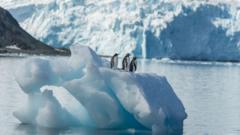A recent study elucidates the connections between increasing salt levels in Antarctic waters and the rapid decline of sea ice, suggesting a transformative shift in this fragile environment.
Saltier Waters Around Antarctica Contributing to Ice Melting, New Study Reveals

Saltier Waters Around Antarctica Contributing to Ice Melting, New Study Reveals
Research indicates that higher salinity levels are accelerating the loss of sea ice in the region.
In a comprehensive new study published in the Proceedings of the National Academy of Sciences, scientists have identified a significant increase in salinity in the waters surrounding Antarctica, directly correlating to the observed decrease in sea ice over the past decade. This research marks a shift from previous periods where Antarctic sea ice was reportedly on the rise, posing critical implications for global climate change.
Lead author Alessandro Silvano, a senior scientist at the University of Southampton focusing on the Southern Ocean, emphasized the importance of these findings, stating that the changes occurring in the Antarctic region could serve as a pivotal factor in global warming and subsequent sea level rise. "The impact of Antarctic ice is massive in terms of sea-level rise, in terms of global warming, and therefore, in terms of extremes," Silvano noted, highlighting the urgent need for further research into these rapid environmental changes.
The study utilized advanced satellite data to track variations in water salinity, applying sophisticated algorithms to analyze small yet significant fluctuations in the salt content of surface waters. Initially skeptical of their findings, researchers soon confirmed the rising trend through physical ocean measurements, reinforcing the validity of their observations.
Sea ice plays a crucial role in regulating Earth's temperatures by reflecting sunlight away from the planet's surface. Historically, while the Arctic has experienced swift sea ice declines due to rising global temperatures, the Antarctic region witnessed a stark contrast, with increasing ice levels until the early 2010s. However, this new evidence signals a concerning transition, as the once stable Antarctic ice is now on a troubling downward trajectory due to saltier seas aiding ice melt.
This study serves as a wake-up call regarding the delicate balance within polar ecosystems, as the ramifications of increasing salinity and decreasing sea ice could resonate far beyond Antarctica, affecting global climate patterns and sea-level trends for years to come.
Lead author Alessandro Silvano, a senior scientist at the University of Southampton focusing on the Southern Ocean, emphasized the importance of these findings, stating that the changes occurring in the Antarctic region could serve as a pivotal factor in global warming and subsequent sea level rise. "The impact of Antarctic ice is massive in terms of sea-level rise, in terms of global warming, and therefore, in terms of extremes," Silvano noted, highlighting the urgent need for further research into these rapid environmental changes.
The study utilized advanced satellite data to track variations in water salinity, applying sophisticated algorithms to analyze small yet significant fluctuations in the salt content of surface waters. Initially skeptical of their findings, researchers soon confirmed the rising trend through physical ocean measurements, reinforcing the validity of their observations.
Sea ice plays a crucial role in regulating Earth's temperatures by reflecting sunlight away from the planet's surface. Historically, while the Arctic has experienced swift sea ice declines due to rising global temperatures, the Antarctic region witnessed a stark contrast, with increasing ice levels until the early 2010s. However, this new evidence signals a concerning transition, as the once stable Antarctic ice is now on a troubling downward trajectory due to saltier seas aiding ice melt.
This study serves as a wake-up call regarding the delicate balance within polar ecosystems, as the ramifications of increasing salinity and decreasing sea ice could resonate far beyond Antarctica, affecting global climate patterns and sea-level trends for years to come.



















